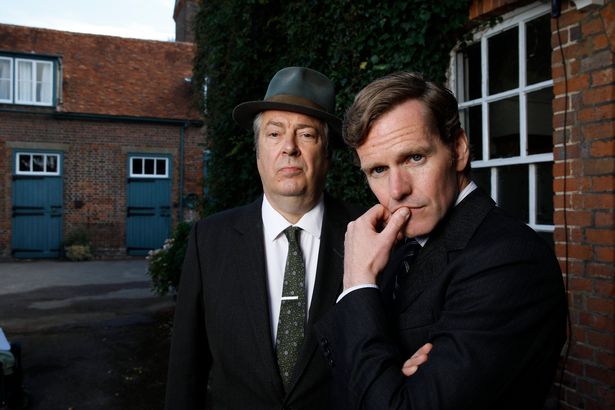ENDEAVOUR.
The classy and stylish Inspector Morse (1987-2000) prequel has now left the building. The last episode, ‘Exeunt’, went out on Sunday 12 March, and there were moist eyes at Fairclough-Baker Towers.
I don’t think there’s ever been a spin-off TV series that was better than the original,
but Endeavour (2012-2023) managed it. The lovingly detailed recreation
of the 1960s and early 1970s was a major selling point, offering nostalgia and
period social and political commentary in equal measure. From a slightly awkward
start, Shaun Evans’ central performance as the outsider-intellectual policeman
matured into a layered and complex one, every inch the man with so much going
on under the surface (although, it has to be said, he doesn’t look a bit like
John Thaw, the star of Morse).
Typically, the scene where he confessed his feelings to the love of his life,
Joan Thursday (Sara Vickers), was revealed as him imagining what he should have
said. In the end, our man had to settle for a hug as, unseen by Joan, a single tear
rolled down his cheek.
Endeavour is very modern in the way it was so loyal to its supporting cast and supporting actors. In Inspector More, pathologist Max DeBryn – played in ‘later life’ by Peter Woodthorpe – disappeared and other pathologists came and went (one of the female replacements dallying romantically with Morse). In Endeavour, the series stuck with the young Max (James Bradshaw), believably building a respectful relationship between the Home Office pathologist and the ingenue police officer.
Jack Bannon, playing Sam, the soldier son of Morse’s boss DI Fred Thursday (the titanic Roger Allam), went off to be famous as the lead in Batman prequel Pennyworth (2019-2022), but in the final three episodes came back to a rewarding storyline for the character. In fact, in ‘Exeunt’, there was an appearance by nearly every major supporting player, with their individual stories paying off consistently – for corrupt cop, DI Arthur Lott (Danny Webb at his most slimy), in a memorably nasty way. There was even the mention of a “police cadet” called Robert Lewis.
It was these little pop culture Easter Eggs that, for me, made Endeavour so special. Never interfering with the plot or the drama, they tipped the wink to those who knew what these period specific references were… Gangster brothers the Fletchers, Sid and Gerald, on Fred’s old manor in London, had the same names as enforcer Jack Carter’s employers in Get Carter (1971); in a story dealing with espionage, there were characters named Schneider and Richmond – monikers used in the 1960s-1970s bleak spy series Callan, while a bus conductor in another episode was named ‘Grant’ in a nod to the actor Bob Grant, who co-starred in the mystifyingly popular sitcom On the Buses (1969-1973).
The production team took this self-awareness to another level in ‘Uniform’, the second episode of the last, 2023 series, with a shopkeeper dressed exactly the same as the shopkeeper in the children’s cartoon Mr Ben (1971-72). Adding to the heady pop cultural brew, there was a Clockwork Orange-style teen gang and a police TV series, Jolly for Short, that riffed on Dixon of Dock Green (1955-1976), even down to the closing ‘this-week’s-moral-of-the-story-is…’ dialogue, which Dixon actor Jack Warner would address directly to the audience. The best example of these series-long homages, though, has to be in the episode ‘Apollo’, based around a film studio making the puppet series Moon Rangers. It was a dead ringer for the Gerry and Sylvia Anderson Supermarionation shows Fireball XL5 (1962-63) and Thunderbirds (1965-66). Shaun Evans liked the idea so much he directed the story.
Endeavour was made by people who love vintage television and film. It’s a rare thing to find that geeky attention to pop cultural detail interwoven with gutsy, emotional stories and the careful and considered development of the eponymous title character.
I’m sure John Thaw would have loved it.




Comments
Post a Comment